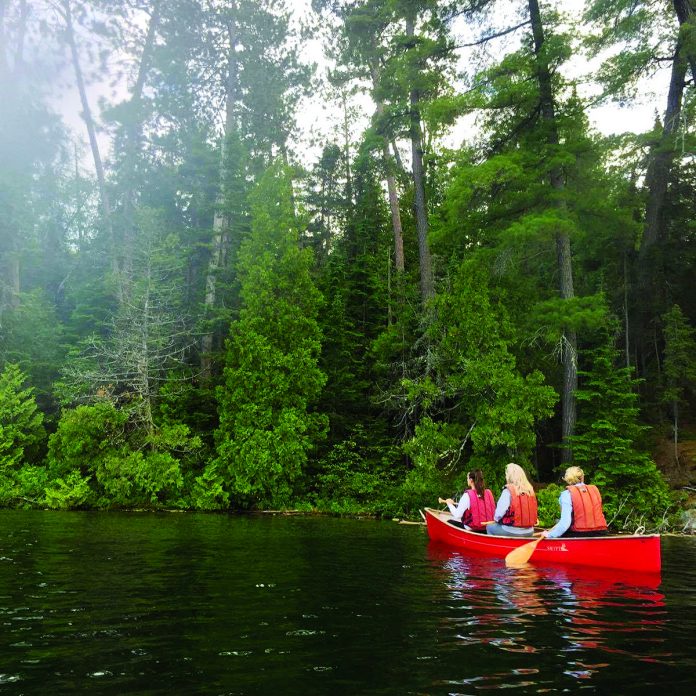I wrote this column several years ago. I ran across it recently buried in the brain of my aging computer.
It’s timely as I complete the grocery list for this year’s upcoming trip to Ontario’s Near North as once remote wilderness destinations have become considerably closer by smoother and faster pavement.
When I first visited Temagami, it lit a burning need to see, smell, and feel true wilderness, an internal candle that has never dimmed. I was a teenager then, anxious and excited by the very thought of heading north.
Now, 63 years later and just a few days from a return to the treasures Lake Temagami holds dear, I find myself just as anxious and excited as ever.
Canadian travel notes
This year (2019) the exchange rate is 35%, meaning that one can buy $1.35 Canadian currency for $1 U.S. The best bet is to do any needed currency trading at a bank.
If you are shopping for a cabin rental or looking at a fully featured resort, be sure to ask whether the quoted rates are in U.S. or Canadian funds. The difference can be a real deal or a painful surprise.
Worms carried north across the border must be in a nondirt bedding.
International border crossings require a current passport.
Hand guns are a 100% no-no. Long guns and a limited amount of ammunition can be declared if a fee is paid, inspection and application completed, and a current hunting license is in hand.
Expect also to be questioned about your destination, length of stay, and if anything is going to be left in Canada.
For the most part, border agents are friendly but serious about their responsibility. Keep in mind that the agent already knows the answer to most of the questions he or she is asking.
Ontario is a metric country. Flip your speedometer from miles to kilos and have a great trip.
Now turn the clock back to that original column.
Temagami
New is everywhere and even Temagami is not immune to technology, the human need to go faster, and an equal need to make an ever shrinking wilderness less wild, easier and with more creature comforts.
I’ve been coming here each year for the past 56 years, and I see what I see, hear what I hear, and appreciate what is locked in time while snuggling through chilling Canadian nights in a comfy, modern sleeping bag.
Fifty plus years ago, I stepped back even deeper in history each time I visited Bear Island, a native settlement based on a heavily wooded island near the hub of Lake Temagami, a multi-legged expanse of crystal clear water and densely wooded shorelines.
There were few buildings on Bear Island then but each had a significant part in the lives of the First Nation residents and their surroundings. The one most evident in my memory was the dock side Hudson’s Bay trading post, where a boy could drool over thick wool blankets and the gear of serious fur trappers.
Trading post
The trading post burned to the ground and no structure built since has even a sliver of the character regardless of its function and modern-day woodsy design. The trading post played a huge part in the history of Temagami as did every other piece and parcel of the fur trade.
In younger years, my cousins and I would find our way to hidden lakes, toting our ancient canvas covered canoe and fishing gear along winding forest trails, those ribbons of foot paths developed by the trappers who hacked out their livings in the lonely shadows of birch, pine and cedar.
Fishing camps
Another significant piece of Temagami’s past was the many fishing camps and youth summer camps based on islands scattered around the lake.
In the late 1800s until the more rapid changes of the mid-1900s, established and busy fishing camps served fine meals in a rustic dining hall, native guides catered to anglers, and large, multi-passenger boats would ply regular routs from town to even the most distant of watery destinations.
And during the short summer, boys and girls — mostly from the U.S., would earn their stripes at the many camps where a gutsy kid could canoe and hike the same back country that fed the trappers of past times. You could tell the canoe trippers by the countless mosquito welts on the tanned skin.
Back then, we fished with casting rods, braided lines and June bug spinners. We lit our nights with Coleman lanterns and slept under Hudson Bay blankets. We pumped water by hand, fished from wooden boats, and filled an ice box with chunks of ice cut from the frozen lake months before.
Then and now some things stay the same. The same sky filled with stars, the same lake water boiled to make safe and perked to make coffee, the same comfort and hope that radiates from a nightly gathering around the stone fireplace.
To this Temagami fan, there is no finer place to be, no better place to return to, and no greater treasure to protect.













